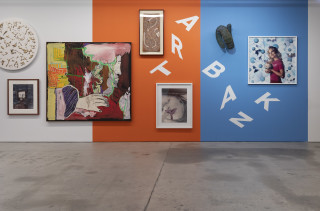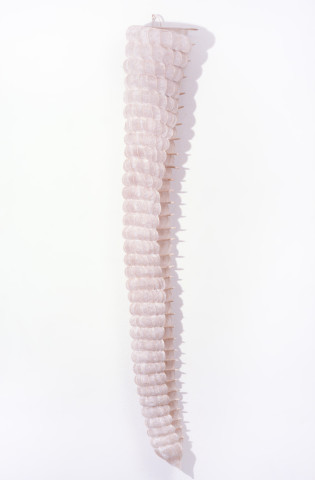Oliver is less interested in reproducing recognisable images than in conjuring objects from the imagination.
Exhibition Dates: 18 July – 18 July 1987
In his poem 'The Other Tiger' Jorge Luis Borges speaks of three - at least three - different kinds of tigers: firstly a symbolic tiger made from" scraps remembered from encyclopedias, against which is placed the real tiger "whose blood runs hotly.'' Driven by the 'ancient and vague adventure' of poetry itself, he seeks out a third tiger, 'not the tiger of the vertebrae' but a 'a form in my dream' which he refers to as 'the other tiger.' Or perhaps there is a fourth - beyond even the form in the dream.
Bronwyn Olilver's 'objects from a landscape,' have left their mark, their tracks - to borrow again from Borges - 'across the muddy edge of a river, unknown, nameless,' on 'convex oceans and the deserts.' They inhabit an 'other' world.
While a work such as 'Bloom' alludes to objects in the real world - the paper nautilus shell for instance - Oliver is less interested in reproducing recognisable images than in conjuring objects from the imagination. But perhaps there is a fourth tiger, so to speak, on which she has set her sights. Not a symbol, not reality (though we can see every bone in the vertebrae of these objects), not even perhaps the form in her dream, but something which combines elements of the natural world, the unconscious, the artist's imagination, a surrealist fascination with the marvelous object and the sublime, almost subcutaneous act of clear-eyed seeing. The most compelling of her works, standing on their own or hanging against walls, are the products of a disciplined and lucid approach, a spareness and intensity which suggests that she has looked upon the world 'with a bare eye' to quote Giacometti, whose sculpture of the early thirties she greatly admires.
Oliver spent 1983/84 in London at the time when sculpture in Britain was undergoing renaissance. In this atmosphere of revived interest and vigorous new challenges she felt confident to take risks, to develop her sculpture beyond the formal concerns of point, line and plane, while continuing to work in the materials with which she has always felt comfortable: paper, cane and wood. From this moment on, her formal concerns were dictated by the materials and processes used, rather than by preconceived formal order or image which she wished to express. By repeating units obsessively, Oliver says she loses conscious control over the form so that at some point it takes over from her, assuming an energy of its own, nestling or curling its way towards an independent life. Her work has developed richer metaphoric and metamorphic content. Relations between the parts are intuitive rather than systematic, they refuse to become monotonous and sterile and often seem to parallel, while not quite imitating, those in nature. The idea or spirit of each peace has become increasingly important. Scale is human, relating to the artist's own body - to fists, fingers and feet. The scale of the works in this exhibition is, for the most part, 'just beyond reach, slightly uncomfortable' so that each work becomes an enactment of the struggle with the materials (tissue paper, rag paper, cane and fibreglass resin) and the idea or spirit of the piece.
Inner/ outer, space/ membrane, skeleton/ skin, open/ closed, presence/ absence, familiarity/ otherness: these are Oliver's constant themes. In the objective/ subjective balancing of tensions between the oppositions lies a hard-won lyric poetry: an 'other' world born of felt relations between the 'bare eye,' the hand and the imagination. Oliver's 'other tiger' is an enigmatic, ambiguous creature: space wrapped in a skin - yet how skinned the creature looks! How inert under its translucent bandages - yet watch closely and it will quiver, lit like a lantern from within or stirred by the air around it. Will it stalk us when our backs are turned? Emotionally charged, it seems familiar, yet at the same time disorienting and a little disquieting. Fragile and vulnerable to the eye, touch it and it becomes strong and inviolate; it will outlast most things on this earth. If it suggests a relic or ancestral being, it is nevertheless not a fossil - there are no mummified ibises among the objects or presences in this landscape. Bleached as driftwood, ivory-pink as a storm-tossed shell, its nakedness is as fresh as the skin of a thing newborn.
Though trussed up with string, 'Captive Object' in its Gabo-like cage, astonishes us with its dignity and authority, its humour and free spirit - and its curious, almost over-weening nobility. Despite their self-sufficiency, their sometimes hermaphrodite self-containment, a dialogue animates these objects, grouped together on their stage, and their is no doubt they are inviting us to participate in the drama.
This is an exhibition of singular grace, wit and coherence which enlarges our experience of sculpture.
— Maggie Gilchrist, June 1987
 Group Show, On Display
Group Show, On Display
Artbank, Melbourne Projects Space, 2025
 Group Show, The First 40 Years
Group Show, The First 40 Years
Roslyn Oxley9 Gallery, 2024
 Bronwyn Oliver The Sculpture of Bronwyn Oliver
Bronwyn Oliver The Sculpture of Bronwyn Oliver
TarraWarra Museum of Art, Healesville, VIC, 2016-17
 Bronwyn Oliver Bronwyn Oliver (1959 - 2006)
Bronwyn Oliver Bronwyn Oliver (1959 - 2006)
Roslyn Oxley9 Gallery, 2006
 Bronwyn Oliver Vine
Bronwyn Oliver Vine
Hilton Hotel, Sydney, 2005
 Bronwyn Oliver
Bronwyn Oliver
Roslyn Oxley9 Gallery, 2004
 Bronwyn Oliver
Bronwyn Oliver
Roslyn Oxley9 Gallery, 2002
 Group Show, The First 20 Years
Group Show, The First 20 Years
Roslyn Oxley9 Gallery, 2002
 Bronwyn Oliver Globe
Bronwyn Oliver Globe
University of New South Wales, Sydney, 2002
 Bronwyn Oliver Tide
Bronwyn Oliver Tide
Quay Restaurant, Sydney, 2001
 Group Show, All Stars
Group Show, All Stars
Roslyn Oxley9 Gallery, 2000
 Bronwyn Oliver Big Feathers
Bronwyn Oliver Big Feathers
Queen Street Mall, Brisbane, 1999
 Bronwyn Oliver Sydney Sculpture Walk
Bronwyn Oliver Sydney Sculpture Walk
Royal Botanic Gardens, Sydney, 1999
 Bronwyn Oliver
Bronwyn Oliver
Roslyn Oxley9 Gallery, 1997
 Bronwyn Oliver Seed
Bronwyn Oliver Seed
Orange Regional Gallery, NSW, 1997
 Bronwyn Oliver
Bronwyn Oliver
Roslyn Oxley9 Gallery, 1993
 Bronwyn Oliver Eyrie
Bronwyn Oliver Eyrie
Hyatt Hotel, Adelaide, 1993
 Bronwyn Oliver
Bronwyn Oliver
Roslyn Oxley9 Gallery, 1991
 Bronwyn Oliver Objects From Another Time
Bronwyn Oliver Objects From Another Time
Roslyn Oxley9 Gallery, 1989
 Group Show, The Cocktail Party (All Gallery Artists)
Group Show, The Cocktail Party (All Gallery Artists)
Roslyn Oxley9 Gallery, 1988
 Bronwyn Oliver
Bronwyn Oliver
Roslyn Oxley9 Gallery, 1988









